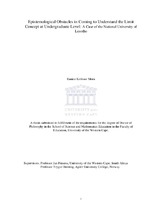| dc.contributor.advisor | Persens, Jan | |
| dc.contributor.advisor | Breiteig, Trygve | |
| dc.contributor.author | Moru, Eunice Kolitsoe | |
| dc.contributor.other | | |
| dc.contributor.other | | |
| dc.date.accessioned | 2013-08-14T12:44:37Z | |
| dc.date.available | 2007/06/25 07:06 | |
| dc.date.available | 2007/07/20 | |
| dc.date.available | 2013-08-14T12:44:37Z | |
| dc.date.issued | 2006 | |
| dc.identifier.uri | http://hdl.handle.net/11394/1921 | |
| dc.description | Philosophiae Doctor - PhD | en_US |
| dc.description.abstract | The purpose of this study was to investigate the epistemological obstacles that mathematics students at undergraduate level encounter in coming to understand the limit concept. The role played by language and symbolism in understanding the limit concept was also investigated. A group of mathematics students at undergraduate level at the National University of Lesotho (NUL) was used as the sample for the study. Empirical data were collected by using interviews and questionnaires. These data were analysed using both the APOS framework and a semiotic perspective.
Within the APOS framework, the pieces of knowledge that have to be constructed in coming to understand the limit concept are actions, processes and objects. Actions are interiorised into processes and processes are encapsulated into objects. The conceptual structure is called a schema. In investigating the idea of limit within the context of a function some main epistemological obstacles that were encountered when actions were interiorised into processes are over-generalising and taking the limit value as the function value. For example, in finding the limit value L for f(x) as x tends to 0, 46 subjects out of 251 subjects said that they would calculate f(0) as the limit value. This method is appropriate for calculating the limit values for continuous functions. However, in this case, the method is generalised to all the functions. When these subjects encounter situations in which the functional value is equal to the limit value, they take the two to be the same. However, the two are different entities conceptually. | en_US |
| dc.language.iso | en | en_US |
| dc.publisher | University of the Western Cape | en_US |
| dc.subject | Calculus | en_US |
| dc.subject | Study and teaching (Higher) - Lesotho | en_US |
| dc.subject | Mathematical analysis - Lesotho | en_US |
| dc.title | Epistemological obstacles in coming to understand the limit concept at undergraduate level: a case of the National University of Lesotho | en_US |
| dc.type | Thesis | en_US |
| dc.rights.holder | University of the Western Cape | en_US |
| dc.description.country | South Africa | |

